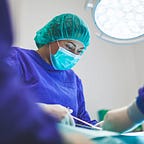Different Views on Surgical Education: Why It’s So Crucial to Train the Trainers
Some of the issues afflicting the standard approach to educating surgeons are discussed in the book “Educating the Educators: Perspectives on Surgical Education.” Constant effort must be placed into evaluating and assessing procedures, there is a disconnect between theoretical and practical learning, and there is a shortage of people who can provide effective surgical training. These are only a few examples of the problems. Additionally, there is a lot of promise in the use of VR/AR technology in the field of surgical education.
During the course of the study, 19 ORNs participated in focus group discussions. Members of the organization had an average age of 47. They employ registered nurses who have worked in hospitals or similar facilities for at least two years. They finished the ORN program, and then they were offered contracts for jobs.
The study’s major objective was to learn how ORNs feel about SSC and how it should be implemented. Focus group members were polled with questions on their SSC-related knowledge and attitudes, and the results were compiled into a questionnaire.
The questionnaire included a wide range of subjects, including preoperative planning, instrumentation, operation details, teamwork, and ethical considerations. Some issues, such as establishing agreement on the procedures to be used and prioritizing patient safety, may be handled in actual clinical settings.
Surgical teams must be prepared to deal with the possibility of miscommunications and mishaps. Careful preparation and constant educational reinforcement are required for this. Further, a successful cultural transformation in surgical teams requires the cultivation of individual accountability.
One of the most important challenges in undergraduate surgical education is making sure students understand the whole spectrum of the surgical care pathway. As part of this experience, students will see surgeries being performed in a variety of settings.
The surgical education community has a responsibility to provide enough resources and attention to its students. However, the great majority of these communications only go in one direction. Furthermore, when it comes to basic surgical training, most countries lack universally accepted standards. Because of these issues, several researchers have been on the lookout for better ways to teach medical students.
Currently, a variety of methods are being implemented to increase student participation. Classroom lectures and instructional simulations are two examples. Additionally, clinical clerkships may provide a course overview for the whole program.
The ward round is a great example of an effective method of assessing one’s knowledge of surgical procedures. A student may demonstrate knowledge of surgical theory via discussion and application, as well as through analysis of a patient case.
One of the main challenges that surgical education must overcome is a shortage of adequate human resources. Students will be unable to get a meaningful education in the area of surgery without access to these essential resources.
From a global viewpoint, a density of 0.7 surgical specialists per 100,000 people indicates a serious shortage. It is estimated that almost five billion people do not have access to effective, affordable surgical care. The surgical workforce has to be restructured on a global basis.
Surgical educators have a duty to provide their students with the knowledge and compassion to practice safe, effective surgery. They may utilize strategies like providing incentives to workers and implementing customized online training to achieve this goal.
One way to reduce the gap between specialists and generalists is via work sharing. Handing off complex tasks to others with less specialized knowledge might improve patient access to safe and cost-effective surgical therapies.
As the field of assessment develops, more and more attention is being paid to ensuring that assessments are reliable and accurate. This involves making sure the results fairly reflect the student’s own understanding and assessment of their own progress in class. Educators can better characterize a student’s learning experience if they employ an assessment methodology rather than relying on a single evaluation.
Although assessments are fundamental to every educational system, the culture in which they are employed determines the nature of the assessments themselves. As such, they need development in a manner that makes them suitable for use inside complex institutional structures. This means that in the future, assessments will include the creation and use of various assessment technologies that are tailored to the specific needs of each student.
Teachers must consider the big picture when deciding which assessment methods to use, and they must tailor those methods to the specifics of their classroom. They may either create a whole new instrument from the ground up or modify an existing one to better suit their purposes.
Virtual and augmented reality are two examples of technology with the potential to radically alter the current state of surgical education. Surgeons stand to gain from their utilization in several ways, including improved engagement and usefulness, better training for surgical specialties, and cheaper diagnoses and treatments.
Together, these resources provide a learning environment that is unprecedented in its breadth and use. Remote surgeons may benefit from more seamless collaboration if they are able to use a shared virtual reality environment. In certain instances, this may need actual surgery.
Virtual aesthetics planning may also improve patient-provider dialogue, records-keeping, and security. Several surgical specialty training schools are using these methods to better serve underserved communities in their instruction.
However, VR and AR are not widely used in the training of surgeons at the moment. Even while technology is progressing, it is still not able to visually recreate the feeling of being in a real environment.
